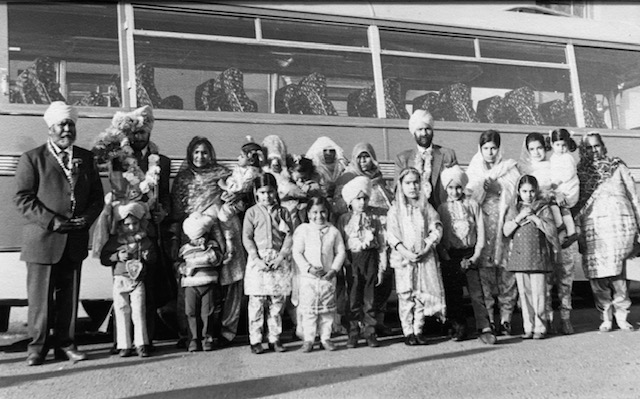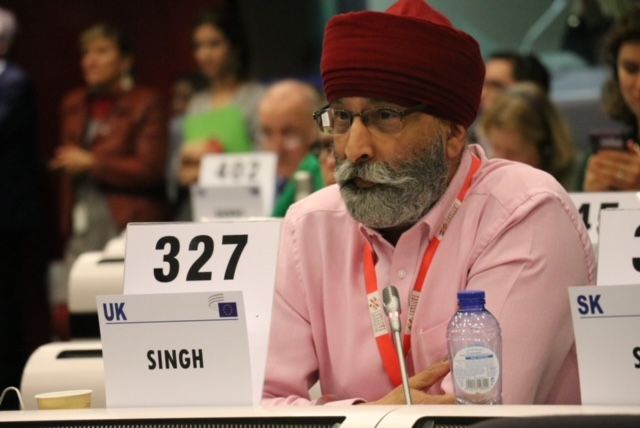Why I'm relearning Welsh in my sixties
I joined Wales TUC last year, around the same time as Mandy James, our Bilingual Communications Officer. Our desks are quite near each other so we’ve had lots of conversations about the Welsh Language, opportunities for staff to learn Welsh and Wales TUC’s Welsh Language Development Plan and ‘Cynnig Cymraeg’ (‘Welsh Offer’).
But, I found myself thinking more and more, I want to know more about how I can learn Welsh in the workplace. I want to reconnect with my Welsh roots in Llanelli, or ‘Llanelly’ as I used to know it, where I grew up as a child.
From the Punjab to Llanelli: Why I want to reconnect with my Welsh Language

My grandfather came to the UK in 1948 after the partition of a part of India which became known as Pakistan. My father followed in 1951 and then my mother in 1959. My grandfather and father lived in Liverpool for a short period of time during the 1950s.
Then, when the community there started to disperse to places like Birmingham, Manchester and Scotland, my grandfather and father and some of their friends and relatives travelled to another nation.
It was Wales.
They decided to make Carmarthen their home.
As they were drapers specialising in door to door selling, they saw this as an opportunity to be able to sell their goods to farmers, the communities nearby and holiday camp sites across Wales including Pwllheli, Bristol, Swansea and the docks in Cardiff. Interestingly, at one point, Carmarthen had the largest Sikh community in Wales too.
By the mid-1950s, my grandfather and father moved to Llanelli, about eight miles from Carmarthen. The other members of the community started to move to Cardiff and Bristol.
I was born in Swansea Morriston hospital in 1962. At that time, my parents lived in Burry Port and my paternal grandparents lived nearby in Llanelli. My family made Llanelli their home and they were well respected by the community. One, because they were the only Sikh family in the town, and two, because they spoke Welsh.
Learning Welsh to work and shop
My great uncle and great aunty learnt Welsh to converse with their neighbours and to sell our goods in the markets. We needed to speak Welsh to work and to be a part of the life around us. My family could speak basic Welsh.
As for me, my memories of growing up in Burry Port and Llanelli are ones of being encouraged to learn and speak Welsh. This was especially useful when I was sent on errands to the local shops for sugar, milk, bread, and loose tea! I remember saying “Bore da” (“Good morning”) or “Prynhawn da” (“Good afternoon”) followed by “Gallai gal bara, llath a siwgur plîs?” (“Can I have bread, milk and sugar please?”) followed by a firm “diolch” or “thank you”.
I have fond memories of playing with Welsh speaking friends and neighbours and I knew, even then, that to be respected and be a part of the community, I needed to first respect the language around me, Welsh.
Losing my Welsh with a move to the big city
In the late 1960s, when my father sadly past away, my family permanently moved to Cardiff. I was around nine at the time, and Cardiff was very different to Llanelli. I lost my Welshness and my Welsh Language as a consequence which I deeply regret and I have never forgotten this.
So, I now encourage my own grandchildren to take the opportunity to learn Welsh and become bilingual. The Welsh Language is a gift which I hope they will embrace.
I now realise that speaking Welsh as a child in Llanelli connected me to the local community and gave me a sense of belonging in Wales. After all, when you travel anywhere in the world, you expect to hear the language and learn about the native culture of those lands.
Ready to start learning again in my sixties
Since joining Wales TUC I have suddenly found myself thinking about my Welsh origins in Llanelli. And I have decided that I am ready to reconnect with the Welsh Language.

I have the opportunity now to achieve my goal to learn Welsh in the workplace. Who knowns, perhaps it will lead to speaking Welsh in the community too.
I am also reminded that in the Sikh religion we are encouraged to continue learning throughout our lives and to respect the community, language and culture of the country where we live. This is very important to me.
My Welsh journey is going to be an exciting, interesting, fun and an evolving one. I’m going to approach it step by step setting my own goals and working to my own timescales. One of the challenges I have set myself is to give you updates in my blogs about my Welsh learning journey. It will be warts and all mind you, the best bits and the bits that are challenging!!
Even though I am now 60 years old, I am ready to put my best foot forward and take on the opportunity of speaking Welsh in the workplace.
And you never know, if you call the Wales TUC office, I may even be the one answering you bilingually on the telephone sometime soon.
You can learn Welsh in the workplace too
There are a number of ways you can learn Welsh in the workplace such as Dysgu Cymraeg and Say Something in Welsh. You may also be able to learn Welsh using the Wales Union Learning Fund (WULF) whether you’re a member of a union or not – contact the union in your workplace to find out more.
